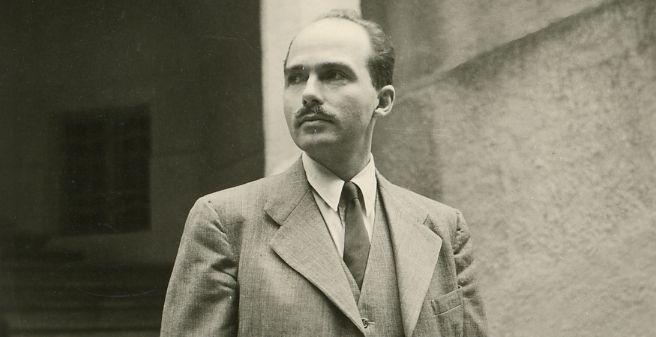The biographical works dealing with Otto von Habsburg usually do not or only briefly remember the activities of the former Crown Prince in connection with the 1956 Hungarian Revolution. None of them mentions that Otto issued a proclamation in Hungarian on October 28, 1956, in which he enthusiastically drew a parallel between the events taking place in Budapest and the astrolabe of Hungarian history. Among other things, he stressed that the revolutionaries were “at the forefront of Christian principles, our sacred freedom and our Hungarianness.”
The first version of the proclamation, corrected by the author, has survived and it can be found in the collection managed by the Otto von Habsburg Foundation. The lines in Hungarian were written after the reorganization of the Imre Nagy government on October 27, when it seemed that change would occur as a result of the events. Otto von Habsburg became aware of the events in Hungary on October 24 and immediately recognized their significance. He was particularly well informed through his extensive network of contacts, including the Royal Hungarian Embassy in Madrid, headed by Ferenc Marosy. On that day, he wrote in his diary, “Rebellion in Hungary,” and the next day, “The uprising promises to be lasting.” On October 26, he asked Ferenc Marosy to pass on his request to General Franco for Spain to protest at the UN against Soviet intervention in Hungary.
Otto von Habsburg was in Belgium on 23 October and did not return to Pöcking until 26. When he did return home, he immediately set about actively supporting the revolution to the best of his ability. One of the first steps was to formulate the already mentioned proclamation in Hungarian. He sent the text to Vienna to Count László Batthyány with his secretary, August Lovrek, with a request to print it out and try to distribute it in Hungary. At the same time, he also dictated the text on audio tape, and on October 29 he sent it to Madrid, where it was broadcast on the Hungarian language program of Spanish radio with the help of Ambassador Ferenc Marosy. At Otto’s request, the broadcast of the sound recording was repeated several times. The proclamation caused a great response in the that time Hungarian emigrant community living mainly in the Spanish-speaking world, but over time it was forgotten.
The text, unearthed 64 years after the revolution, commemorates the heroes of the War of Independence. It concisely reflects Otto von Habsburg’s thoughts and hopes about the events in Hungary in October 1956 and shows the commitment of the former Crown Prince to Hungary.
Gergely Fejérdy
